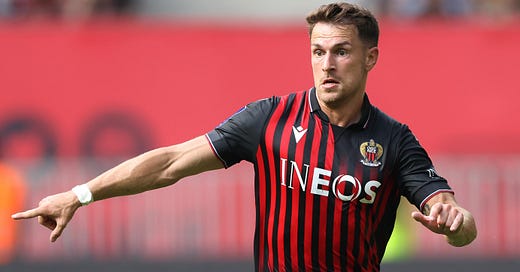INEOS Group: Unveiling Manchester United's Potential New Owner
Thrice a week, I write an email about the intersection between Sports and Money. If you would like to receive it directly in your inbox, subscribe now.
Hello there!
The Manchester United sale has been stealing headlines recently, with insiders hinting at a victorious bidder emerging.
The likely contender? None other than UK billionaire Jim Ratcliffe and his powerhouse, INEOS Group.
Word on the street is that Ratcliffe's prepared to shell out a staggering £6.3+ billion for the lion's share of the club—far exceeding its estimated value. In today's deep dive, we'll examine Jim Ratcliffe’s INEOS empire, and where Manchester United could slot into his impressive sports portfolio.
INEOS Sports
Should INEOS pull off the Manchester United acquisition, the esteemed club will find its home within INEOS Sports, a division of INEOS Group Ltd. INEOS Sports had humble beginnings in 2010, sponsoring the jerseys of Lausanne Hockey Club, but it truly exploded onto the scene in 2017 during a major buying spree across various sports.
2017 - Football. Acquires Swiss club FC Lausanne-Sport
2018 - Sailing. The main sponsor for Team UK, now renamed INEOS Britannia
2019 - Cycling. Acquire Team Sky, now renamed INEOS Grenadiers
2019 - Football. Acquire French club OGC Nice
2020 - Formula 1. Acquire one-third stake in Mercedes-AMG Petronas Team
2021 - Rugby. Performance partner to All Blacks
INEOS Sports brings together all the sports teams that they own and tries to generate synergy amongst them. Teams under INEOS Sports are encouraged to work together and share their expertise. For example, the cycling team is advised by the Mercedes F1 group on how to improve aerodynamics, while some cyclists have trained in Nice’s football club facilities.
In football, clubs may gain an edge through insights from other top-tier sports professionals, like nutritionists, physiotherapists, and technical experts.
While this inter-sport synergy sounds promising in theory, its impact on actual performance is yet to be proven.
Unfortunately, INEOS Sports' financial performance remains undisclosed, so assessing the venture's success is challenging. However, Jim Ratcliffe, the founder of INEOS Group once mentioned.
We make US$6 billion to US$7 billion a year in profit. What’s wrong with investing a bit of that into sport, good challenges and some good people?
Evidently, INEOS Sports' primary goal may not be profit-driven.
If INEOS does indeed secure Manchester United, the iconic club would become the crown jewel of INEOS Sports. Aligning with the values of INEOS Sports, Ratcliffe sees United less as a financial asset and more as a community treasure.
Our interest in that club would be purely in winning things.”
Manchester United is a different beast
Compared to many of INEOS Sports' current constellation of sporting assets, their potential new addition, Manchester United is a very different beast.
The rumored cost of £6.3 billion (€7.23 billion) far eclipses all of INEOS Sports' current teams.
A quick rundown of INEOS Sports team deal sizes:
£300 million, F1 Mercedes-AMG Petronas Team
£110 million, Sailing INEOS Britannia
£89 million, Football OGC Nice
£8 million, Rugby All Blacks
Moreover, the Manchester United acquisition wouldn't just be a mere slice of INEOS Group's earnings; it would represent nearly 3.5 times the conglomerate's 2022 net profit.
Still, with a net worth of approximately £21.05 billion, Jim Ratcliffe is more than capable of financing the Manchester United deal using his personal fortune alone.
Broader Agenda of INEOS Sports?
Jim Ratcliffe once called INEOS the largest company that no one has heard of before. With his recent spending spree on sports teams, that's likely no longer the case.
Critics argue that INEOS is using sports to distract from its core business—oil, gas, and petrochemicals. As the UK's largest plastic producer and a major proponent of fracking, they're no stranger to environmental controversy.
While I'm no environmental expert and can't verify these claims, the effectiveness of focusing attention on sports ventures is evident. This tactic, known as "sports washing," is when a company sponsors a popular sports team or event to clean up its image.
Examples of sports washing:
1928: Coca-Cola sponsored the Olympics
1976: McDonald’s sponsored the Olympics
1972: Marlboro started its 50 years of sponsorship with the F1 team starting with BRM
In football, Gulf states like Qatar and the UAE have followed suit, sponsoring PSG and Manchester City, respectively.
Regardless of INEOS Sports' true intentions, one thing is certain: acquiring the renowned Manchester United will undoubtedly bring them into the spotlight.
If you liked this post, subscribe now to receive future posts directly into your inbox. Thank you and see you in the next one!






